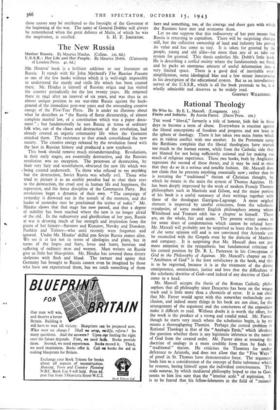The New Russia
Mother Russia. By Maurice Hindus. (Collins. 12s. 6d.) U.S.S.R.: Her Life and Her People. By Maurice Dobb. (University of London Press. 4s. 6d.) MR. HINDUS' book is a brilliant addition to our literature on Russia. It stands with Sir John Maynard's The Russian Peasant as one of the few books without which it is well-nigh impossible to understand the sturdy and virile life which has been created there. Mr. Hindus is himself of Russian origin and has visited the country periodically for the last twenty years. He returned
there in 1942 after an interval of six years, and was thus in an almost unique position to see war-time Russia against the back- ground of the immediate post-war years and the astounding creative energy of the Five-Year Plans. He is under no illusions about what he describes as " the Russia of fierce dictatorship, of almost complete martial law, of a constitution which was a paper docu- ment " ; but fundamentally he sees Russia in terms of ordinary folk who, out of the chaos and destruction of the revolution, had already created an organic community life when the Germans attacked them. The resistance to that attack consolidated the new society. The creative energy released by the revolution fused with the best in Russian history and produced a new synthesis.
This book should remove much misunderstanding. Revolutions, in their early stages, are essentially destructive, and the Russian revolution was no exception. The processes of destruction, by their very fury and wastefulness, obscured the new life which was
• being created underneath. To ;hosc who refused to see anything but the destruction, Soviet Russia was wholly evil. Those who tried to picture it as an earthly paradise had to shut their eyes to the destruction, the cruel cost in human life and happiness, the repression, and the fierce discipline of the Communist Party. But revolutions beget a dynamic of their own. "The campaign of yesterday is drowned out in the tumult of the moment,' and the leader of yesterday may be proclaimed the traitor of today." Mr.
. Hindus shows that that stage has now passed, and that a degree of stability has been reached where the new is no longer afraid of the old. In the rediscovery and glorification of her past, Russia at war is drawing much of her strength and inspiration from the giants of her history—Suvorov and Kutuzov, Nevsky and Donskoy, Pushkin and Tolstoy—who until recently were forgotten and ignored. Under Mr. Hindus' skilful pen Soviet Russia comes alive. We see it at last not in terms of ideologies and plans, but in terms of the hopes and fears, loves and hates, heroism and suffering of ordinary men and women. MQst writers on Russia give us little but blue-prints. Mr. Hindus has covered those dreary skeletons with flesh and blood. The torture and agony that Germany has brought to Russia cannot even be imagined by those who have not experienced them, but we catch something of them here and something, too, of the courage and sheer guts with which the Russians have met and overcome them.
Let no one suppose that this rediscovery of her past means that Russia is returning to capitalism. There will be surprising changes still, but the collective ownership of land and industry has proved its value and has come to stay. It is taken for granted by the people, young and old alike—far more than any of us take our system for granted. This thesis underlies Mr. Dobb's little book. He is describing a settled society where the fundamentals are fixed, and he packs an enormous amount of useful information into a very limited space. There is a good deal of inevitable over- simplification, some ideological bias and a few minor inaccuracies in his description of the educational system. But as an introductory survey of the U.S.S.R., which is all the book pretends to be, it is wholly admirable and deserves to be widely read.
GODFREY WILKINSON.


























 Previous page
Previous page